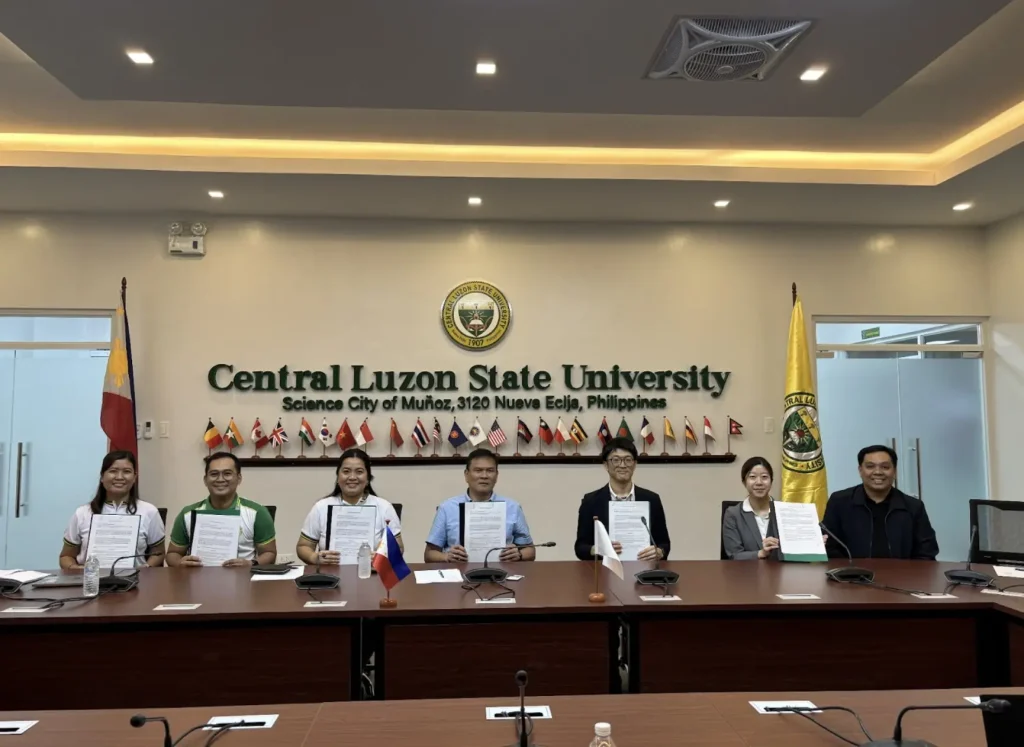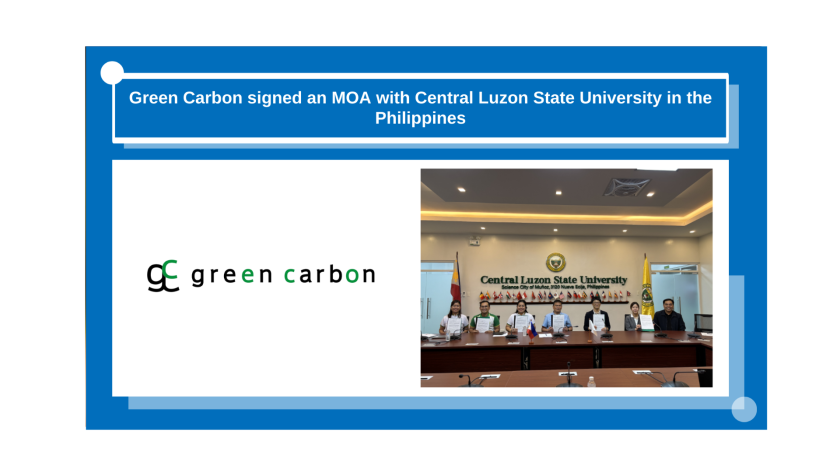~Promoting support for the introduction of technology and training for local farmers, aiming to improve farmers’ income and spread sustainable agriculture~
Green Carbon Inc. (CEO: Jun Okita, hereinafter referred to as “Green Carbon”), a company engaged in the development and sale of nature-based carbon credits, signed a Memorandum of Agreement (MOA) on Tuesday, July 29, 2025, with Central Luzon State University (CLSU), located in Nueva Ecija Province in northern Philippines. The agreement focuses on reducing greenhouse gas (GHG) emissions in rice cultivation and generating carbon credits.
Under this partnership, Green Carbon will work to reduce methane emissions through the introduction of Alternate Wetting and Drying (AWD) (*1) in paddy fields. In collaboration with CLSU, the company will support the introduction of technologies and provide training for local farmers, thereby establishing a system to generate and utilize carbon credits from GHG reductions. This initiative aims to simultaneously improve farmers’ income and promote the dissemination of sustainable agricultural practices.
〇For inquiries regarding this release and further details, please contact:
○ For inquiries regarding this release and further details
https://green-carbon.co.jp/contact/
○ Download the company profile of Green Carbon Inc.
https://green-carbon.co.jp/download-form/
○ Related release from Central Luzon State University
https://clsu.edu.ph/news-and-updates/article/clsu-forges-key-partnerships-with-local-and-international-collaborators-for-r-d-activities
◆Background of this Partnership
Green Carbon is engaged in the creation of nature-based carbon credits mainly in Southeast Asia, operating across a wide range of fields including forest conservation, rice paddies, mangrove planting, cattle methane reduction, and biochar projects. In addition to developing projects tailored to the natural resources of each region, the company ensures efficient and highly transparent operations through site selection and monitoring using satellite data.
In the Philippines in particular, annual greenhouse gas (GHG) emissions from the agricultural sector reach approximately 54 million tons (*2), of which around 13 million tons (about 25% of total agricultural emissions) are derived from rice paddies (*3). In light of this situation, Green Carbon has been collaborating with local research institutions since FY2023 to launch a project aimed at reducing methane emissions from rice paddies through the use of Alternate Wetting and Drying (AWD) technology.

○Scene from the MOA signing with CLSU
◆About Nueva Ecija Province
Nueva Ecija is known as the “Rice Granary of the Philippines,” as it is the country’s largest rice-producing province, accounting for approximately 9.5–10% of national rice production. Its large-scale output of 1.6 to 2.0 million metric tons annually (*4) makes a major contribution to the nation’s food supply and supports the goal of achieving self-sufficiency in rice. While the province’s climate is highly suitable for rice cultivation, challenges such as soil acidification, nutrient deficiencies, soil texture, and weed infestations require careful management. To address these issues, the region has been advancing the dissemination of high-yielding Special Purpose Rice (SPR) varieties through collaborative initiatives such as cluster farming and partnerships with institutional buyers, thereby enhancing agricultural productivity and strengthening food security (*5).
This groundbreaking partnership focuses on the introduction and dissemination of AWD (Alternate Wetting and Drying) technology across lowland rice production in Nueva Ecija, aiming to significantly reduce methane emissions from rice cultivation while fostering the adoption of sustainable agricultural practices throughout the region.

○Nueva Ecija Province
◆About Central Luzon State University (CLSU)
Central Luzon State University (CLSU) is one of the Philippines’ leading national universities, highly recognized for its contributions to science and technology, particularly in agriculture and related fields. Established in 1907 as the Central Luzon Agricultural School (CLAS), the institution has since evolved into its current status with the vision of becoming a world-class national research university. CLSU is dedicated to cultivating globally competent and responsible individuals while generating knowledge aimed at poverty reduction and sustainable development.
◆Future Outlook
As Green Carbon expands its diverse operations across Southeast Asia, the company is focusing in the Philippines on a JCM project aimed at reducing methane emissions from rice paddies through the introduction of Alternate Wetting and Drying (AWD). Project formulation is currently underway based on the methodology approved in early February 2025. In Japan, it has been decided that JCM credits can be applied under the GX-ETS (*6) to offset corporate emissions that exceed their reported limits, and demand is expected to grow further. In light of these developments, Green Carbon will continue to ensure the economic viability of its projects while contributing to decarbonization efforts in both the Philippines and Japan.
※1: Alternate Wetting and Drying (AWD)
AWD is a technique for rice paddies in which irrigation and natural drying are alternated every few days, based on the water level in the field. Compared with continuous flooding, AWD reduces water use and contributes to water resource conservation.
※2: Annual GHG emissions from the agricultural sector in the Philippines
Source: Department of Environment and Natural Resources (2023)
https://niccdies.climate.gov.ph/files/documents/The%20Philippines-%20NDC%20Implementation%20Plan%20-%20072024.pdf
※3: GHG emissions from rice paddies in the Philippines
Source: Journal of Food, Agriculture and Environment (2016)
https://www.researchgate.net/publication/273636139_Greenhouse_gas_emissions_from_rice_production_in_the_Philippines_based_on_life-cycle_inventory_analysis
※4: Rice production in Nueva Ecija Province
Source: Assessment of Yield Enhancement Intervention under National Rice Program and Rice Competitiveness Enhancement Fund to Palay Production and Income of Nueva Ecija Farmers (2022)
https://www.researchgate.net/publication/360369190_Assessment_of_Yield_Enhancement_Intervention_under_National_Rice_Program_and_Rice_Competitiveness_Enhancement_Fund_to_Palay_Production_and_Income_of_Nueva_Ecija_Farmers
※5: Climate and soil characteristics of rice cultivation in Nueva Ecija Province
Source: Production constraints and suitability of selected lowland rice soils in Nueva Ecija and Pangasinan (2016)
https://www.ukdr.uplb.edu.ph/etd-undergrad/5109
※6: Emissions Trading System (ETS)
Based on Japan’s Growth-Oriented Carbon Pricing framework, companies are required to operate under government-set emissions caps, achieving reductions or trading emissions allowances accordingly.
◆ Green Carbon Inc.
Representative: Jun Okita, CEO
Head Office: PREX North 9F, 2-3-2 Kojimachi, Chiyoda-ku, Tokyo, Japan
Established: December 2019
Business Activities: Development and sales of carbon credits, agriculture-related projects, environmental projects, other related businesses, and ESG consulting
Website: https://green-carbon.co.jp/
◆ About Green Carbon
Guided by the vision of “Harnessing the power of life to save the Earth,” Green Carbon develops and supports projects that generate, register, and sell nature-based carbon credits both in Japan and abroad. The company is also engaged in agriculture-related businesses, R&D initiatives, and ESG consulting.
Its business activities span Japan, Southeast Asia, Australia, and South America, creating credits from rice paddies, biochar, forest conservation, carbon farming, mangrove planting, and cattle methane reduction. In Japan, Green Carbon obtained certification in FY2023 for the country’s first and one of the largest-scale rice paddy J-Credit projects (approx. 6,220 t). In FY2024, the company plans to expand this initiative to around 40,000 ha (approx. 80,000 t).
Green Carbon also provides “Agreen,” a one-stop platform service that streamlines the entire process of credit registration, application, and sales. By simplifying procedures and documentation, the service reduces the administrative burden on credit creators.
◆ Follow Green Carbon on Social Media
note: https://note.com/green_carbon/
Carbon Credits Journal: https://biz-journal.jp/carboncredits/
LinkedIn: https://www.linkedin.com/company/green-carbon-inc/
Facebook: https://www.facebook.com/profile.php?id=61557429326458
X (Twitter): https://mobile.x.com/GreenCarbon2019
Wantedly: https://www.wantedly.com/companies/greencarbon2019
YouTube: https://www.youtube.com/channel/UCYO4WnGOHDaVB1ikxheZasA

